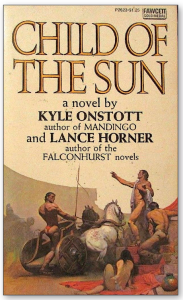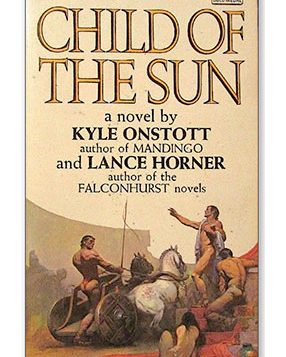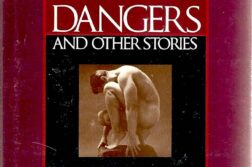WHILE sorting a box of donated books for a prison class I was teaching, I noticed that the cover art on a decades-old book was the work of famed fantasy and science fiction artist Frank Frazetta. The cover featured nearly naked muscular men in a variety of poses that suggested—to my “homoerotic mind”—homoerotism. The back cover gave a short synopsis of the novel.
Child of the Sun tells the story of the youth Varius Avitus Bassianus, destined to become emperor of the Roman empire. Varius spurned woman. His erotic longings led to a very different kind of love. Anyone he fancied was quickly offered to him. And no man, whether solder or citizen, dared to refuse him. As his perverted passions grew more and more bizarre, even the voluptuaries of Rome recoiled in horror. I glanced at the copyright page and saw that the book was originally published in 1966. I decided to read the novel and was prepared to be offended by the portrayal of the gay characters. What I found was a book that could have been written today without apology.
Child of the Sun, by Kyle Onstott and Lance Horner, is a historical novel about the boy emperor who has become known as Elagabalus (203–222 CE). The authors took what is historically known about the young emperor and used it to convey the varied sexual and emotional aspects of gay life. Much of what is purported to be historical truth on the life of Elagabalus was written by the historical pawns of subsequent reigns or years after his death, so that rumor and innuendo are accepted as truth. Still, the ancient character assassination makes excellent fodder for a sensationalized novel of a gay boy emperor.
The novel is at times campy, kinky, humorous, brutal, romantic, and strongly sexual. It is a celebration of gay sex that embraces the possibilities of same-sex marriage and monogamy—this at a time when homosexuality could land you in jail. The book’s appearance in 1966, three years before Stonewall, is truly remarkable, not only because of the explicitness of the gay sex but also because of its acceptance of long-term same-sex relationships.
What the book lacks in intellectual depth it makes up for in sexual and emotional intensity. When every same-sex fantasy can be instantly converted into reality, the possibilities for erotic invention become quite wide. Varius has all kinds of fantasies; and size does matter. Zoticus, his first husband, is legendarily well-endowed, so much so that when Varius marries his life partner Hierocles, he’s concerned how the young beauty will measure up. But for young Varius, there are also other concerns: his need for excitement, love, and his devotion to
the Syrian god Elagabalus. As luck would have it, sex is an essential aspect of each of these needs.
In the early parts of the novel, Varius is seen as a spoiled, effeminate boy. He was just fourteen years old when he became
emperor through the machinations of his grandmother. Although his family, senators, and some Roman soldiers viewed his feminine histrionics as offensive, Varius himself makes no apology for his antics. There’s a mix of gay personalities in the novel, created with broad strokes but never overtly offensive. There are effeminate slaves and bisexual slaves, soldiers and farm boys who are often sexual pawns to the gayly promiscuous Varius.
When Hierocles, a young charioteer slave, enters Varius’ life, the novel become a gay romance complete with country getaways, lovers’ quarrels, and pledges of lifelong fidelity. They become co-Caesars with Hierocles taking the dominant role as the husband. Hierocles’ masculine beauty counters Varius’ feminine appeal. What began as a master-slave relationship becomes an equal partnership.
Varius eventually grows out of his erratic behavior and matures into a gay man who’s intelligent and shrewd. Along with his handsome husband Hierocles, he struggles to control his destiny and his legacy. He fights for his sexual, political, and emotional life, and he will not accept less than victory. He ultimately does fail, but this failure has less to do with his sexual orientation than with the political maneuverings of his family and the general instability of the emperor’s position in 3rd-century Rome. It is this transformation that is the most appealing aspect of the book. Varius becomes a hero out of Greco-Roman mythology, flawed but with a greatness of soul. The last pages of the novel are intensely and unapologetically romantic.
Child of the Sun seems to have had a fairly large printing; used copies are plentiful at on-line used bookstores. How did this novel gain such wide distribution when it is so obviously gay fiction? The probable reason is that the book tapped into a popular trope of the ’60s: the decadence of the Roman world. Most non-gay readers would have been oblivious to the book’s authentically erotic gay content and assume it was all part of the sick acceptance of that behavior in ancient Roman. The back cover of the book describes the book’s lurid content in a tone of feigned disapproval. The book resembles the sensationalist pulp fiction of the time, which is what allowed it to be published, while offering an erotic thrill to some readers that comes through loud and clear.
Unlike the self-loathing protagonists of other gay novels of this era, Child of the Sungives a feeling of normality to gay sex and love that even contemporary novels often lack. The positive portrayal of same-sex behavior in Child of the Sunmakes this a book that deserves to be remembered for its innovative stance.
Heterosexual readers of the period may have recoiled in disgust, but I’m certain that many gay men and boys who discovered this gay gem were thrilled by Varius’ defiance of convention and his ability to take advantage of his position as emperor to engage in an orgy of sexual and political adventures. The events depicted may not be historically accurate, but there are elements of authenticity that were enough to touch the hearts of many young gay men who had dreams of love and fidelity even as they were unable to express their same-sex feelings in all their manifestations.
Chay Lemoine’s essays and short fiction have appeared in a variety of publications.






